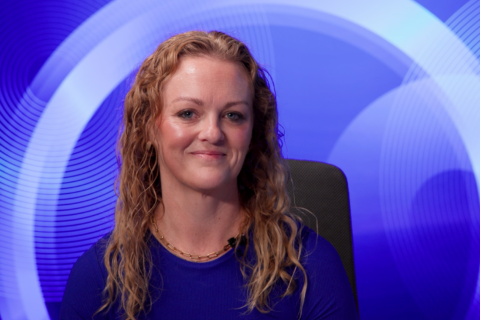This content is provided by the Fairfax County Department of Transportation.
Traffic in the D.C. region has surged in recent months. With thousands of employees returning to the office, congested morning and evening commutes and competition for limited workplace and marketplace parking spaces are growing sources of stress, anxiety and frustration for drivers across the region.
There are ways to make things easier, whether that means using public transit, biking or ridesharing. Several employers – including companies, government agencies, non-profit organizations and even institutions of higher education – are taking an active role, working with the Fairfax County Department of Transportation’s Commuter Services program to reduce congestion and make life a little better for everyone on the road.
“We all know that commuting is one of the toughest challenges employers face, and the more ways we can make that a non-issue, the better,” said Josh Cantor, the director of parking and transportation at George Mason University. “You don’t want to drive people away because their commute is unbearable.”
The university, which is located in densely-populated Fairfax County, Virginia, has set up a transportation system that’s designed to make it easier for employees and students to commute.
It includes perks and incentives such as preferred parking and employer-supported programs.
“It’s one of those necessities that I think universities need in order to manage access to campuses,” Cantor said.
While the school has 41,000 students and 8,000 employees, it only has so many parking spaces available.
That’s why it relies on shuttle buses and carpooling to cut down on traffic.
“We have buses running between our campuses, to the nearby Vienna Metro Station, shopping centers and remote parking lots,” Cantor said. “It’s a comprehensive strategy.”
The university offers incentives including the commuter choice program, which allows employees to request up to $325 monthly to commute by public transit or vanpool.
It is a tax-free benefit paid by the university.
“For those folks, it’s meaningful,” Cantor said. “It really is the difference between being able to work here or not because the cost of commuting would be considerably high.”
He’s seen firsthand how impactful that can be.
“I’ve had people write me and tell me that they were able to give up their car and save enough money to buy a house,” Cantor said.
Making carpooling easier
Carpooling might at first seem like a lot to deal with, but it can be a pretty simple and cost-effective way to commute, according to Cantor.
Plenty of George Mason University employees already carpool with family members or coworkers.
The university launched its own carpooling website to make the process easier.
“Students, faculty and staff can go online, and whether they’re looking for a ride or looking to share a ride, it will match them based on location, day of the week and time of day,” explained Cantor.
Many people who head to the university are traveling from places such as Centreville or Springfield, making carpooling a convenient alternative to being on the road as a solo driver.
Employees and students can also receive a 20% to 40% rebate on parking permits for carpooling, based on how many people are in their carpool.
For some who work at the school, carpooling has become a consistent part of their lives.
Allison Ward Parsons, a literacy faculty member at the university’s College of Education and Human Development, first started carpooling with her husband during the COVID pandemic and they never stopped.
“It gives us an opportunity to talk together on the way, plan our day and then decompress on the way home,” Parsons said. “It’s been really useful for us.”
On top of that, Parsons noted that carpooling is eco-friendly.
“It helps us use fewer cars, diminish our carbon footprint and hopefully have a better impact on the environment,” she said.
Erin Geiger, an assistant professor at the university’s Inclusive Early Childhood Education Program, carpools with her husband as well.
“It’s really nice to have that time together,” Geiger said. “It’s a nice way to reduce our driving and our carbon footprint.”
They use the university’s special carpool parking spots, which are closer to campus buildings.
“Especially on rainy or cold days, it makes walking inside a little bit nicer,” Geiger said with a smile.
The big picture: Less traffic, less pollution
George Mason University is proving that schools, workplaces and other organizations can play a significant role in making commuting more sustainable.
With financial incentives and carpooling options, the university is actively reducing the number of solo drivers on the road.
Those looking for similar ideas are encouraged to check out Fairfax County Commuter Services, a program within the Fairfax County Department of Transportation, which has resources to help residents and employees find alternatives to drive-alone commuting.
It helps people figure out their best commuting options, assists employers in offering benefits and supports residential communities in promoting alternate transportation modes.





